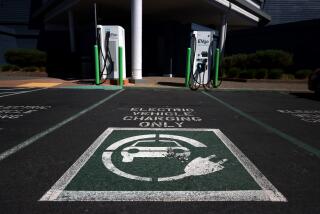Raising the energy bar
- Share via
The environmental movement has been trying for more than 20 years, through both Democratic and Republican administrations, to force the auto industry to build cars that get better mileage. It took record gas prices and worrisome signs of a changing climate to do it, but the light finally turned green this week with the Senate’s passage of a history-making energy bill.
The final version, expected to win quick passage in the House and to avoid President Bush’s veto pen, doesn’t go nearly far enough to wean the nation off fossil fuels or reduce the threat of global warming. Most disappointing, a mandate for the country to get 15% of its electricity from renewable sources like the sun and wind was removed. Also deleted were provisions that would have helped pay for all that clean energy by revoking tax breaks previously doled out to the oil and gas industry. Yet even if the bill takes a smaller step than hoped, it’s still a major stride forward.
Fuel standards in the United States are among the weakest in the industrialized world, encouraging production of wasteful and environmentally disastrous vehicles. Under the energy bill, the average U.S. fleetwide standard will be 35 miles per gallon by 2020, about a 10-mpg bump from the current level. That’s projected to save at least 1.1 million barrels of oil a day in 2020 (the U.S. currently consumes about 20 million barrels a day). Also worth celebrating are provisions that will improve energy efficiency for lightbulbs, heating and cooling systems and appliances.
The bill’s approach to renewable fuels is its most troublesome element, though there are good points along with the bad. It requires 36 billion gallons of biofuels by 2022, compared to roughly 6 billion gallons produced today -- the vast majority of the current supply being ethanol made from corn. The mania for corn ethanol is already driving up food prices, polluting waterways and having other negative effects on the environment, and the energy bill will only worsen the problems. Yet it does take steps to address them by stating that 21 billion gallons must be advanced biofuels not made from corn, and 16 billion of that must be “cellulosic” ethanol, which can be made from a wide variety of plant materials.
Even the failure of the renewable energy standard doesn’t represent a total loss. Many senators who formerly opposed such a standard have reversed course, and the Democratic leaders of both the House and Senate have vowed to try again. It will be among next year’s most important environmental initiatives.
More to Read
Get the L.A. Times Politics newsletter
Deeply reported insights into legislation, politics and policy from Sacramento, Washington and beyond. In your inbox twice per week.
You may occasionally receive promotional content from the Los Angeles Times.










